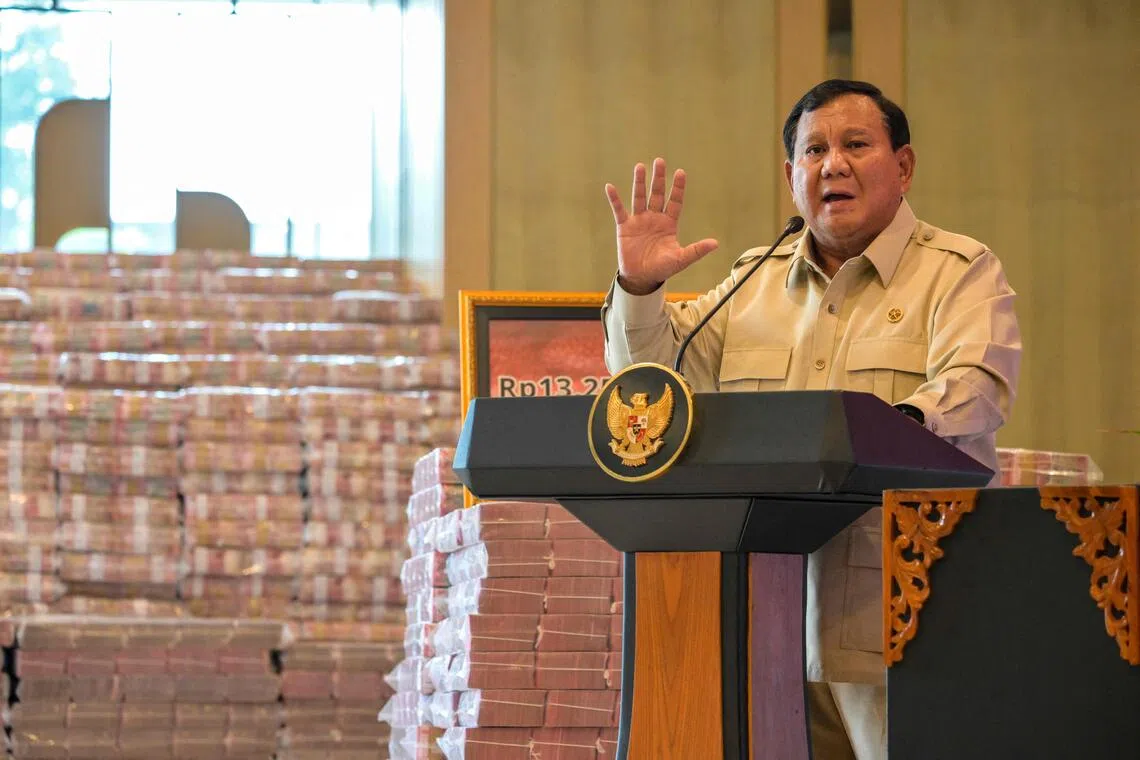Prabowo begins second year with cool Indonesia growth, silent polls
Sign up now: Get insights on Asia's fast-moving developments

Mr Prabowo Subianto has responded to economic unease with waves of stimulus, including US$1.8 billion (S$2.3 billion) in cash aid for 35 million households.
PHOTO: AFP
Follow topic:
JAKARTA – Indonesian President Prabowo Subianto enters his second year in office facing mounting challenges such as tepid economic growth, stubbornly high youth unemployment and a troubled multibillion-dollar free meals programme.
Now, a new concern looms: slipping voter support, the extent of which is hard to gauge because of a lack of credible public polling in his first year.
“The fact that there have been no good polls made public since February indicates all polls have likely been detecting declining support for Prabowo,” said political analyst Kevin O’Rourke. “No polling client is willing to approve the release of findings that would irk the President.”
Leaked findings from one credible pollster, reported by several local media outlets, showed Mr Prabowo’s approval rating in September had slipped to about 59 per cent from 79 per cent earlier in 2025. Indikator Politik Indonesia said afterwards that it had not released the results of the survey.
Another research group, the Centre of Economic and Law Studies, on Oct 20 gave the President a score of three out of 10 in its one-year performance report, down from five at the 100-day mark.
One of the last credible polls made public came at that 100-day point, when Litbang Kompas found Mr Prabowo’s popularity at 81 per cent, higher than his predecessor’s at the same stage of his presidency.
Mr Prabowo has responded to economic unease with waves of stimulus,
Protests have eased since riots in August, and the President has acknowledged a need to improve his landmark free meals programme.
On other fronts, Indonesia’s new sovereign wealth fund, Danantara, is nearing its first major investments, while Mr Prabowo has also gained diplomatic visibility, including attending a Gaza peace summit
But Mr Prabowo is still in a “dual battle with youth activists, on one hand, and financial markets – particularly foreign exchange – on the other”, said Mr O’Rourke, principal at Jakarta-based consultancy Reformasi Information Services. “Next year will test whether the administration can contain unrest while also avoiding currency depreciation.”
Perceptions of inconsistent policies, worsening corruption and problems with his administration’s free meals programme all could hurt approval ratings, and the government does appear to be “very sensitive about the numbers,” said Mr Nicky Fahrizal, a researcher at the Jakarta-based Centre for Strategic and International Studies.
The coming year will likely see a young administration still finding its footing while pushing ahead with its many announced programmes.
Mr Prabowo “doesn’t have a mechanism for self-correction”, in part because he is surrounded by a largely young and inexperienced team, said Associate Professor Marcus Mietzner at Australian National University.
“In terms of where Prabowo will be heading, I think we’ll see more of the same,” he said. Bloomberg

